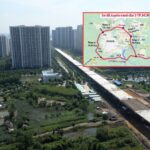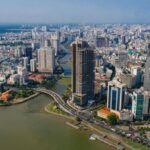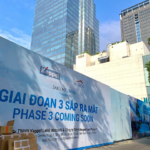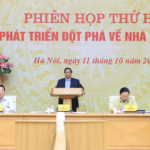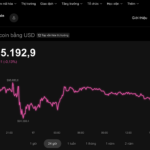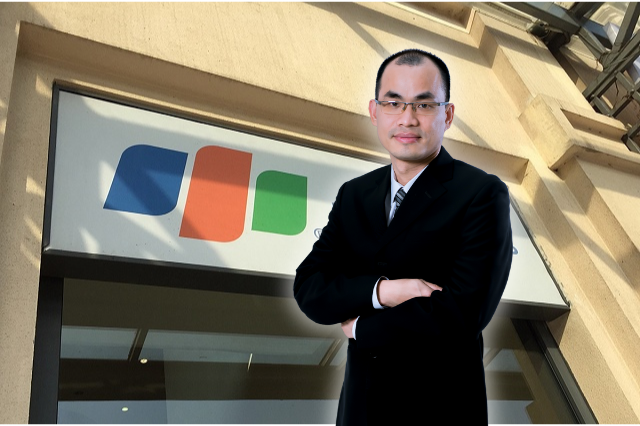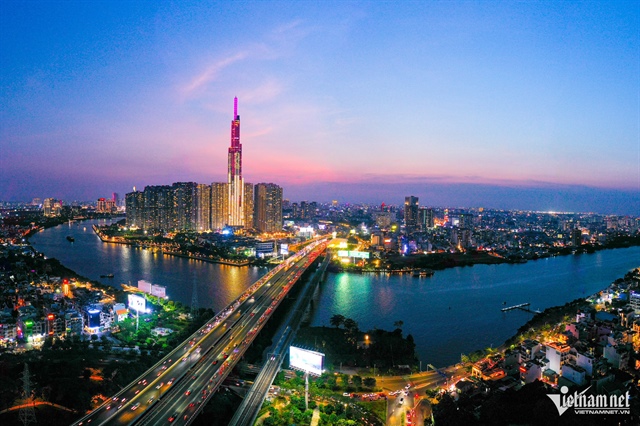
The vibrant energy of Ho Chi Minh City, a burgeoning metropolis. Photo: Nguyen Hue |
The ambitious vision is reflected in the specific goals outlined in the Draft Political Report of the Party Congress, such as an average GRDP growth rate of 10-11% per year, a digital economy reaching 40%, and an average per capita income of up to 15,000 USD…
Sharing with VietNamNet, every citizen, from hospitals to classrooms, from design desks to production floors, expresses their collective hope for a more civilized, modern, dynamic, and compassionate Ho Chi Minh City.
Architect Nguyen Ho (Ho Chi Minh City Architects Association): Ensuring Social Housing and Urban Identity Preservation Are Not “Victims” of Economic Development Pressures
The Draft Political Report and the plan for infrastructure and architectural landscape development in Ho Chi Minh City for the 2025-2030 period bring much anticipation, with specific goals such as the ratio of transportation land to urban construction land reaching 16-26%; the proportion of urban wastewater treated to standards by 2030 reaching 40-45%; over 90% of household waste recycled or treated using new technologies; and by the end of 2030, an additional 199,400 social housing units…
On the eve of the congress, I am particularly concerned about and place high expectations on the issues of social housing and urban identity preservation. Regarding social housing, the plan aims to relocate 20,000 units along canals and build hundreds of thousands more, but it does not fully address challenges like speculation, which has been a factor in the abnormal rise in housing prices over the past period.
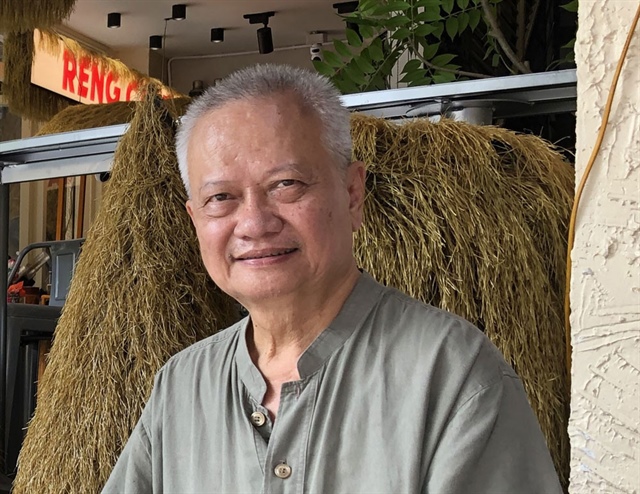 Architect Nguyen Ho |
Additionally, addressing the core issue of profit pressure (12-15%) from shareholders and sales commissions of enterprises is crucial. This makes it difficult for low-income workers to access housing.
I propose implementing a housing cooperative model, similar to Sweden’s successful approach. Citizens contribute capital and manage it non-profitably, minimizing negative factors and controlling speculation. The government can support with land, tax exemptions, and rapid modular construction at a fixed price of 600 million VND per unit, with a 10-year restriction on resale.
Regarding urban identity, while the focus on the ecological corridor along the Saigon River, Thi Vai, and preserving the “port-city-river-sea” is commendable, the emphasis on highways, TOD (Transit-Oriented Development), and green spaces (5.5 m²/person) could overshadow unique cultural values like the Southern tube houses, floating markets, or the Hoa District (former District 5) without a specific strategy.
Identity is not just about landscapes but also the joyful, open lifestyle of old Saigon. Attention should be given to preserving cultural spaces like the Tet Cholon Festival or pedestrian streets. I suggest designing housing with stylized traditional rooflines, integrating traditional markets into TOD, organizing community dialogues to preserve areas like Bui Vien Street, and prioritizing land for heritage before high-rise development.
In summary, while policy formulation is a necessary foundation, it is not yet optimal. We need to shift from traditional summarization to incorporating clear actions. Plans must include specific solutions to combat speculation, encourage cooperative models, and preserve urban identity. Only then can Ho Chi Minh City achieve sustainable development, truly benefiting its citizens.
Dr. Mai Duc Huy (Deputy Director of Saigon General Hospital): Aspiring for Ho Chi Minh City to Become a “Smart Healthcare City”
The 1st Ho Chi Minh City Party Congress (2025-2030 term) takes place as the city enters a new development phase—becoming a multi-centered megacity after merging with Binh Duong and Ba Ria – Vung Tau. In this context, healthcare remains a pillar of social welfare, closely tied to quality of life and the Human Development Index (HDI).
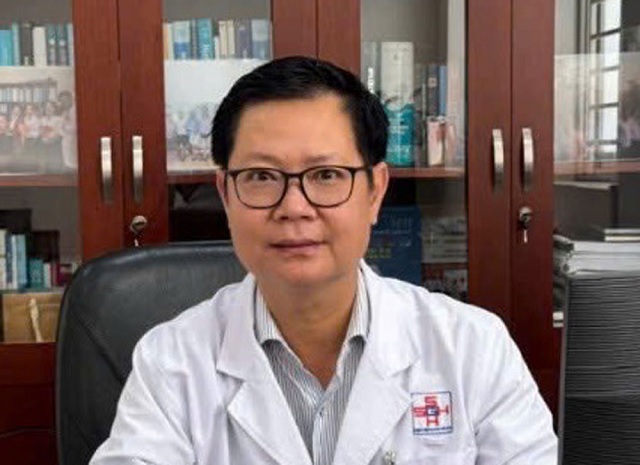
Dr. Mai Duc Huy
|
The Draft Political Report sets a clear goal of comprehensively strengthening the healthcare system, developing primary, preventive, and specialized healthcare in tandem, aiming to become a leading healthcare hub in Southeast Asia. This is also the shared aspiration of the medical community, dedicated to serving in a dynamic, modern, and humane system.
Citizens hope for comprehensive, equitable, and convenient healthcare, from prevention and diagnosis to treatment and rehabilitation. They expect high-quality services with skilled doctors, modern equipment, and efficient processes, protected by a robust public health system ready to respond to epidemics and climate change.
In my view, a necessary breakthrough is transforming Ho Chi Minh City into a “smart healthcare city,” where every citizen has a unified electronic health record, enabling online appointments, results, and consultations. Applying artificial intelligence (AI) and big data to healthcare management not only enhances treatment efficiency but also embodies the principle of “prevention is better than cure.”
Additionally, the healthcare sector needs special mechanisms for greater financial and human resource autonomy, international cooperation, and support for medical professionals, ensuring medical ethics and skills remain a source of pride for the city named after Uncle Ho.
I believe that with fair, transparent, and citizen-centered healthcare policies, Ho Chi Minh City will not only be an economic leader but also a healthy, compassionate, and livable city in the region.
Assoc. Prof. Nguyen Hanh Nguyen (Nguyen Tat Thanh University): Establishing Research Procurement Mechanisms for Architecture Schools, Instead of Relying Solely on Foreign Consultants
As a university lecturer, I strongly support the direction of “making science, technology, and innovation the driving force of development.” However, the role of universities, research institutes, young intellectuals, and creative communities in the innovation ecosystem must be emphasized.
I propose establishing research procurement mechanisms for urban design and sustainable development models from the government for architecture, planning, and engineering schools, rather than relying solely on foreign consultants.
Ho Chi Minh City should promote the “learning – creative city” model, where every citizen can participate in creating living spaces.
We need to focus on the younger generation and intellectuals. The congress should prioritize policies nurturing young talent, especially in creative fields like architecture, design, technology, and arts.
I hope the city will support training centers, workshops, applied research, and connections between schools, businesses, and society. Intellectuals and lecturers wish to participate directly in urban policy advisory and review boards.
Above all, I expect this Party Congress to not only set ambitious goals but also concretize them with feasible, transparent implementation mechanisms involving intellectuals, scientists, students, and citizens. A creative, humane, and green Ho Chi Minh City is our shared aspiration.
Entrepreneur Le Bao Quoc (Welgun Technology JSC): Ho Chi Minh City Must Master Core Technologies, Not Just Follow Digital Transformation Trends
Reading the Draft Political Report for the 1st Ho Chi Minh City Party Congress, I am particularly interested in the focus on science, technology, and innovation as the central driver for 2025-2030.
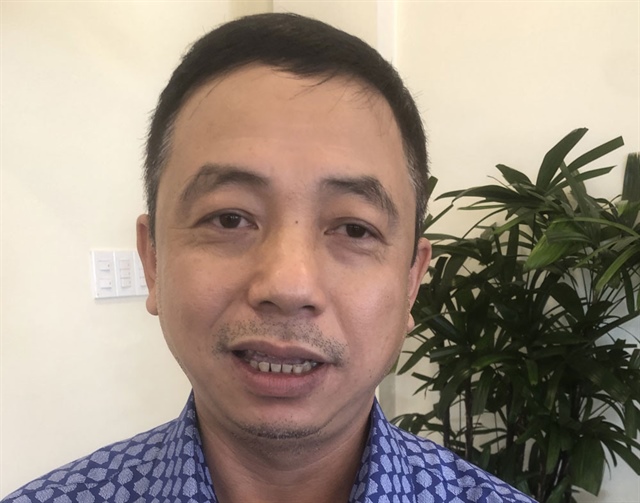
Entrepreneur Le Bao Quoc |
I hope the city will go further, not just focusing on new technologies like AI, big data, or digital transformation, but also developing foundational technologies that are the “roots” of true innovation.
Specifically, these include electronics, mechatronics, precision mechanics, new materials, and bio-chemical technologies. These are the foundations for all modern industries, from AI and robotics to healthcare and renewable energy. Without mastering hardware, machinery, or materials, we will remain “high-level laborers” in the global value chain.
Ho Chi Minh City, as the nation’s largest science and technology hub, with research institutes, universities, high-tech zones, and a dynamic business community, is well-positioned to lead a “core technology mastery” program. The city should support businesses in researching and manufacturing equipment and products based on Vietnamese inventions and intellect.
Ho Chi Minh City should encourage collaboration among universities, research institutes, and businesses, with preferential capital and patent protection to build a sustainable technology ecosystem.
I believe that if this congress prioritizes foundational technology development, the city will not only be the fastest adopter but also a creator of its own technology, contributing to a self-reliant and sustainable Vietnamese economy.
Quoc Ngoc
– 01:00 13/10/2025
Industrial Ecosystem Linked to Seaports Propels Ho Chi Minh City to Regional Prominence
Unlocking its full potential, Ho Chi Minh City must harness the power of an industrial belt seamlessly integrated with seaports and a synchronized logistics network. This strategic move will propel the economic powerhouse to new heights, enhancing its competitive edge and enabling deeper participation in the global supply chain.
Hot This Week: Ho Chi Minh City’s Ring Road 3 Set for Technical Opening by Year-End
Proposals to increase the income threshold for social housing eligibility to 40 million VND/month for couples, Dong Nai’s commitment to commence and complete over 9,000 social housing units next year, the final 100-day push to open Ho Chi Minh City’s Ring Road 3 by year-end, and updates on resolving bottlenecks for nearly 3,000 stalled projects are among the top headlines of the past week.
Văn Phú Expands Development into Southern Market
The Southern real estate market, centered around the emerging Ho Chi Minh City, is witnessing a significant investment surge from leading property developers. This wave is marked by a series of large-scale projects poised to transform the urban landscape entirely. This trend aligns with a strategic vision focused on critical transportation and infrastructure hubs within the city, aiming to redefine traffic flow and commercial dynamics across the entire Southern Key Economic Region.
Saigon Centre Secures Ho Chi Minh City’s Approval for Phase 3 Investment After Three Decades of Inactivity
Nestled in the heart of Ho Chi Minh City’s most vibrant intersection, Saigon Centre Phase 3 occupies a prime “diamond-grade” location. After over three decades of inactivity, this landmark project has recently been awarded an amended investment certificate, marking a significant milestone in its development.
Elevate Social Housing Income Threshold for Couples to VND 40 Million/Month
The government has recently issued Decree 261, raising the income threshold for eligibility to purchase or rent social housing to 20 million VND/month for individuals, 40 million VND/month for married couples, and 30 million VND/month for single parents with children. This new regulation is expected to expand access to social housing for millions of middle-income workers in major urban areas.



